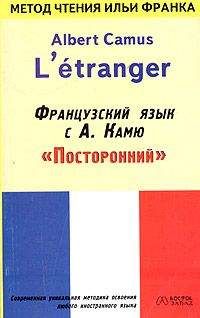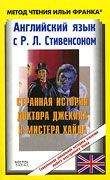Роберт Стивенсон - Английский язык с Р.Л.Стивенсоном. Остров сокровищ
The next morning he and I set out on foot for the “Admiral Benbow” (на следующее утро он и я отправились пешком в «Адмирал Бенбоу»), and there I found my mother in good health and spirits (и там я нашел свою мать в полном здравии и в хорошем настроении). The captain, who had so long been a cause of so much discomfort (капитан, который так долго был причиной столь большого беспокойства), was gone where the wicked cease from troubling (ушел = умер, и с ним прекратились все неприятности: «ушел туда, где злодеи перестают причинять беспокойство»; wicked — злой, порочный; to cease from — перестать делать что-либо, бросить). The squire had had everything repaired (сквайр все отремонтировал: «имел все починенным»), and the public rooms and the sign repainted (приказал перекрасить общие комнаты и вывеску), and had added some furniture (и приказал добавить некоторую мебель) — above all a beautiful arm-chair for mother in the bar (прежде всего — прекрасное кресло для моей матери за стойкой). He had found her a boy as an apprentice also (он отыскал ей = нанял ей мальчика в подмогу; apprentice — ученик, подмастерье, помощник), so that she should not want help while I was gone (чтобы ей не понадобилась /моя/ помощь, пока я отсутствовал).
despised [dɪs`paɪzd] lament [lə`ment] cease [si:s] apprentice [ə`prentɪs]
You can fancy the excitement into which that letter put me. I was half beside myself with glee; and if ever I despised a man, it was old Tom Redruth, who could do nothing but grumble and lament. Any of the under-gamekeepers would gladly have changed places with him; but such was not the squire’s pleasure, and the squire’s pleasure was like law among them all. Nobody but old Redruth would have dared so much as even to grumble.
The next morning he and I set out on foot for the “Admiral Benbow,” and there I found my mother in good health and spirits. The captain, who had so long been a cause of so much discomfort, was gone where the wicked cease from troubling. The squire had had everything repaired, and the public rooms and the sign repainted, and had added some furniture — above all a beautiful arm-chair for mother in the bar. He had found her a boy as an apprentice also, so that she should not want help while I was gone.
It was on seeing that boy that I understood, for the first time, my situation (посмотрев на того мальчишку, я понял впервые свое положение). I had thought up to that moment of the adventures before me (/раньше/ я думал только о приключениях, /ожидающих/ меня впереди; up to — вплоть до), not at all of the home that I was leaving (но совсем не о доме, который покидал); and now, at the sight of this clumsy stranger (и теперь, при виде этого неуклюжего незнакомца), who was to stay here in my place beside my mother (который должен был остаться здесь, на моем месте = вместо меня, рядом с моей матерью), I had my first attack of tears (я впервые расплакался: «имел первый приступ слез»). I am afraid I led that boy a dog’s life (боюсь, я обеспечил тому мальчишке жалкое существование: «собачью жизнь»; to lead — вести, управлять; приводить, заставлять); for as he was new to the work (потому что, так как он был новичком), I had a hundred opportunities of setting him right and putting him down (у меня были сотни удобных случаев, чтобы придираться к нему; to set right — исправлять; to put down — унизить, поставить на место: «поместить вниз»), and I was not slow to profit by them (и я не замедлил воспользоваться ими; slow — медленный; медлительный).
The night passed, and the next day, after dinner (ночь прошла, и на следующий день, после обеда), Redruth and I were afoot again (мы с Редрутом были в движении снова), and on the road (/вышли/ на дорогу). I said good-bye to mother and the cove where I had lived since I was born (я попрощался: «сказал прощай» с матерью и бухтой, где я жил с самого рождения), and the dear old “Admiral Benbow” (и с милым старым «Адмиралом Бенбоу») — since he was repainted, no longer quite so dear (хотя, заново покрашенный, он был больше уже не таким милым; quite — вполне, совершенно). One of my last thoughts was of the captain (одна из моих последних мыслей была о капитане), who had so often strode along the beach with his cocked hat (который так часто бродил по побережью со своей треугольной шляпой), his sabre-cut cheek (с сабельным шрамом на щеке), and his old brass telescope (и своей старой медной подзорной трубой). Next moment we had turned the corner (через миг мы свернули за угол), and my home was out of sight (и мой дом исчез из поля зрения).
clumsy [`klʌmzɪ] opportunities [ɔpə`tju:nɪtɪz] corner [`kɔ:nə] sight [saɪt]
It was on seeing that boy that I understood, for the first time, my situation. I had thought up to that moment of the adventures before me, not at all of the home that I was leaving; and now, at the sight of this clumsy stranger, who was to stay here in my place beside my mother, I had my first attack of tears. I am afraid I led that boy a dog’s life; for as he was new to the work, I had a hundred opportunities of setting him right and putting him down, and I was not slow to profit by them.
The night passed, and the next day, after dinner, Redruth and I were afoot again, and on the road. I said good-bye to mother and the cove where I had lived since I was born, and the dear old “Admiral Benbow” — since he was repainted, no longer quite so dear. One of my last thoughts was of the captain, who had so often strode along the beach with his cocked hat, his sabre-cut cheek, and his old brass telescope. Next moment we had turned the corner, and my home was out of sight.
The mail picked us up about dusk at the “Royal George” on the heath (почтовый дилижанс подобрал нас, когда уже почти стемнело, у /гостиницы/ «Король Георг», на пустоши). I was wedged in between Redruth and stout old gentleman (меня втиснули между Редрутом и коренастым пожилым джентльменом; to wedge in — вклинивать, втискивать; wedge — клин), and in spite of the swift motion and the cold night air (и несмотря на быструю езду и холодный ночной воздух), I must have dozed a great deal from the very first (я, должно быть, надолго заснул с самого начала = сразу же; to doze — дремать, забываться; a great deal — много), and then slept like a log up hill and down dale through stage after stage (и затем спал, как сурок: «чурбан», /пока мы мчались/ по горам, по долам, от станции до станции; dale — долина, поле); for when I was awakened at last (так как когда я был разбужен наконец), it was by a punch in the ribs (это было ударом в ребра), and I opened my eyes to find that we were standing still before a large building in a city street (я открыл глаза, чтобы обнаружить = и увидел, что мы стоим /неподвижно/ = что мы остановились перед большим зданием на городской улице), and that the day had already broken long time (и что «день уже пробился давно» = давно рассвело).
“Where are we (где мы)?” I asked.
“Bristol,” said Tom. “Get down (вылезай).”
heath [hi:θ] stout [staut] dozed [dəuzd] punch [pʌntʃ] building [`bɪldɪŋ]
The mail picked us up about dusk at the “Royal George” on the heath. I was wedged in between Redruth and stout old gentleman, and in spite of the swift motion and the cold night air, I must have dozed a great deal from the very first, and then slept like a log up hill and down dale through stage after stage; for when I was awakened at last, it was by a punch in the ribs, and I opened my eyes to find that we were standing still before a large building in a city street, and that the day had already broken long time.
“Where are we?” I asked.
“Bristol,” said Tom. “Get down.”
Mr. Trelawney had taken up his residence at an inn far down the docks (мистер Трелони выбрал себе место жительства = поселился в трактире, возле доков; to take up — брать, занимать), to superintend the work upon the schooner (чтобы руководить работой на шхуне; to superintend — управлять, наблюдать). Thither we had now to walk (туда мы должны были теперь пойти), and our way, to my great delight (и наш путь, к моей великой радости), lay along the quays and beside the great multitude of ships of all sizes and rigs and nations (лежал вдоль причалов и рядом с = мимо огромного множества кораблей всех размеров, оснасток и наций). In one sailors were singing at their work (на одном матросы пели за работой); in another, there were men aloft high over my head (на другом — люди высоко висели над моей головой; aloft — наверху, в высоте), hanging to threads that seemed no thicker than a spider’s (болтаясь на нитях, которые казались не толще паутинок; spider — паук). Though I had lived by the shore all my life (хотя я всю жизнь жил на побережье), I seemed never to have been near the sea till then (казалось, что я никогда до этого не был рядом с морем = словно видел его теперь впервые). The smell of tar and salt was something new (запах дегтя и соли был чем-то новым /для меня/). I saw the most wonderful figureheads (я видел великолепные фигуры на носах кораблей), that had all been far over the ocean (которые все побывали за океаном = в дальних плаваниях; far — далеко). I saw, besides, many old sailors (я видел, помимо того, множество старых моряков), with rings in their ears, and whiskers curled in ringlets (с серьгами в ушах и бакенбардами, завитыми в колечки), and tarry pigtails, and their swaggering, clumsy sea-walk (с просмоленными косичками, и их качающейся, неуклюжей морской походкой); and if I had seen as many kings or archbishops I could not have been more delighted (и если бы я увидел столько же королей или архиепископов, я не был бы восхищен более).




